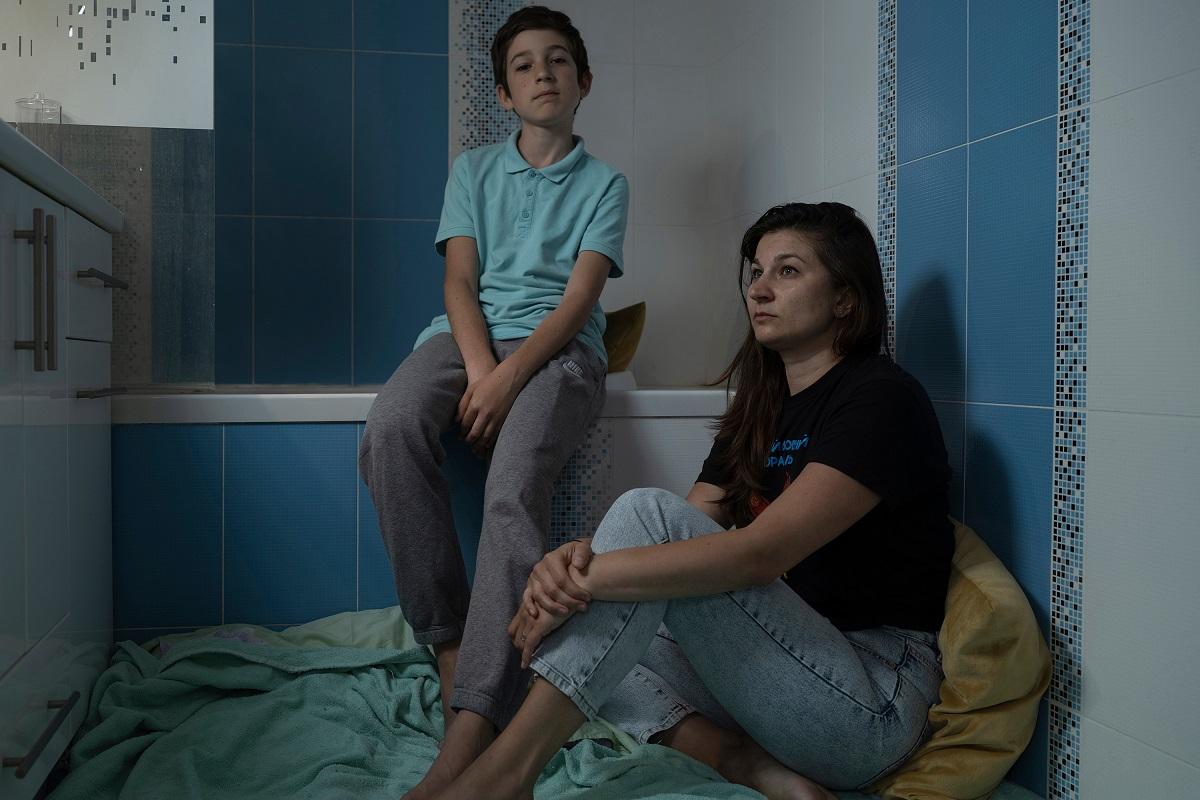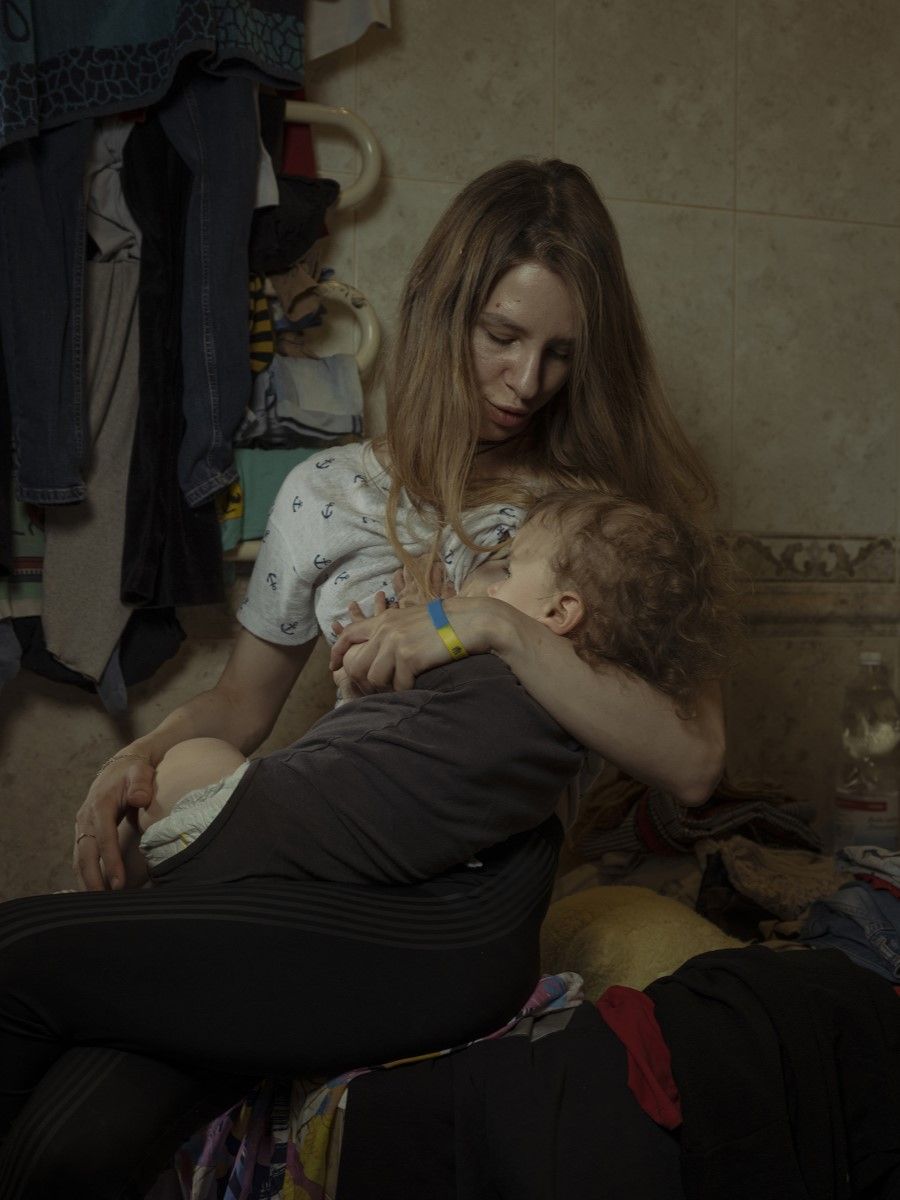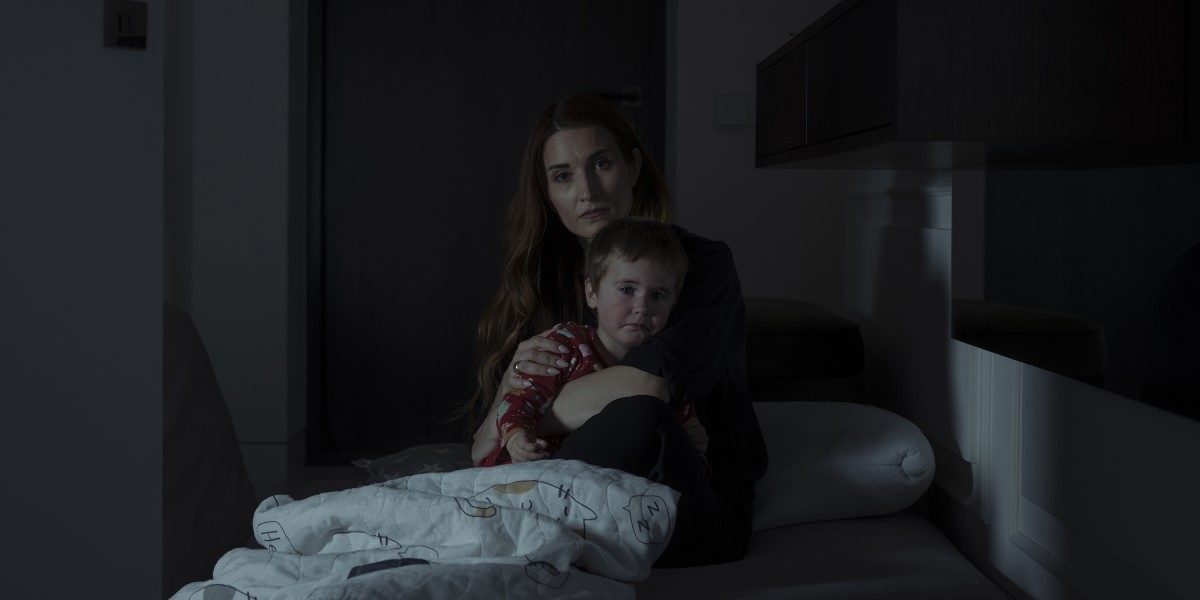
Viktoriia Pysmenna with her son Mark in the bathroom of their apartment in Kyiv where they typically shelter during the night air raids.
15:43 JST, June 4, 2023
KYIV, Ukraine – Each time the sirens wake Viktoriia Pysmenna, she follows the same drill. Desperate for more sleep, the 35-year-old single mother rolls over, scrolls through the air raid Telegram channels – “almost like checking the weather” – and starts counting minutes.
If another Russian airstrike is headed for Kyiv, she must get out of bed, again. She must wake her 12-year-old son, Mark, in the middle of the night, again. If it’s a drone, they might have a couple of hours. A ballistic missile? Just minutes.
The boy already knows where to go: into the bathtub, where his mother tucks him in with pillows and blankets and waits for the blasts – hopefully from Ukraine’s air defenses thwarting the attack.
This is the terrifying nighttime routine for families living under Russia’s relentless air assault on Kyiv.
Kyiv largely emptied out at the start of Russia’s brutal invasion last year, but after a string of Russian military failures, many families returned. The capital is once again bustling, with people crowding downtown streets, restaurant patios, and neighborhood parks to enjoy the arrival of summertime temperatures.
It’s also a place where, in recent weeks, a full night’s sleep has become nearly impossible.
Ukraine’s new arsenal of air defense systems, including two Patriot systems donated by the United States, Germany and the Netherlands, have allowed its armed forces to shoot down and destroy most of the drones and missiles hurtling toward its capital.
But the same air defenses that protect the city of more than 3 million people have also made it a higher-value target, with Moscow apparently intent on destroying the Patriots, which cost more than $1 billion each, and other valuable systems.
Kyiv has suffered 20 air attacks in the past month, most in the middle of the night. Some have been deadly, as falling debris from intercepted missiles crashed into homes, buildings and yards.
Each time the air alarm echoes, families must instantly decide where to take cover, how quickly, and for how long, weighing safety against exhaustion after a month of insomnia.
Parents tuck their children into closets or bathrooms or corridors, following the so-called “two wall rule.” Couples living in high-rise apartments dart into underground garages, basements or subway stations. Others simply push their beds as far from the windows as possible, protecting young children with their bodies.
The next morning Kyiv residents must continue with their day, sending children to school late, ordering an extra espresso shot on the way to work or taking a nap in an office meeting room – knowing they will face it all again in just a few hours.
Early Thursday morning, the city woke to a series of blasts that left three people dead, including a 9-year-old girl. Some ran to a basement shelter – only to find it locked.
The explosions came so suddenly that Pysmenna had no time for her usual decision-making. Just before 3 a.m., about five minutes after the alarm started, a roaring explosion shook her 15th floor apartment and jolted her and her son out of bed.
This time, they ran straight to the hallway. Shielded by multiple walls, the mother hoped they would be safe.
“Can I bring you a pillow?” she asked Mark as he yawned and nodded, sitting on the tile floor outside their apartment door.
“I’m going to spread the duvet so you can lie down,” she told him. She tucked him under a fleece blanket and gently stroked his hair, hoping he would sleep. Then she scrolled through her phone, hoping it would tell her when to expect the next blast.
They live on the 15th floor, in a two-bedroom, roughly 690-square-foot apartment. Pysmenna always dreamed of living in a place with a view, where she could watch the sun set over Kyiv’s skyline. Now, that view has become a constant threat.
Earlier that evening, she had pointed out places in the city where a fighter jet was once shot down, where a missile was destroyed, where a building caught flames during an attack. At night, she sees beams of light flash across the sky, searching for drones.
Mark said the booms have become slightly less scary over time. When he lies awake at night, he plays a Brawl Stars video game on his phone to keep his mind off the explosions.
Pysmenna, a local TV news editor, recently worked the overnight shift at her office. It was early May, a relatively calm time in Kyiv, and it was the only night she left Mark home alone. (His father, Pysmenna’s former spouse, is a soldier fighting in the east.)
She didn’t realize until later, when a colleague texted her, that the air defenses were shooting Russian targets that night, and the explosions in their neighborhood were loud.

Kateryna Davydchenko with her son Vova in the bathroom of the house they are staying in, and where they spent the time during the air raids that have been increasing in the past month in the Ukrainian capital.
“My heart was beating fast,” Mark said, recalling that night. But instead of calling his mother or anyone else, he walked himself to the bathroom, curled up in the tub alone, and slept.
For Kyiv parents with younger children, like Kateryna Davydchenko, 31, it’s impossible to explain the booms. When she hears the blasts, she grabs her nearly 2-year-old son and carries him to the bathroom. He’s often shaking, not fully awake, agitated but unaware of what is going on.
“Sometimes, he’s awake and just pointing at the window,” Davydchenko said.
Daria Altukhova, 37, rushes her 3-year-old son to their hallway, where they sleep on couch cushions. Her husband stays in bed. On loud nights, Altukhova said, sleeping next to her son helps her calm down. But even when she’s able to sleep, she wakes up feeling uneasy.
“You begin your day in a stressful way,” she said. “Your mind is still there.”

Daria Altukhova and her son Danylo in the hallway of their apartment in Kyiv where they typically shelter during the night air raids.
The near-nightly attacks are creating a collective sleep crisis for Kyiv residents.
Yuriy Pogoretsky, a somnologist, runs Ukraine’s Laboratory of Sleep, the country’s only clinic for sleep disorders. The war has roughly tripled the number of patients seeking help. This month, as strikes intensified, there was a tenfold increase in requests for online consultations, he said.
Pogorestsky advises companies to designate places for employees to take short naps, and he tells patients to go to bed early, to achieve a deep phase of sleep before the airstrikes start. He encourages families to prepare a bag with essentials for sleeping in a bunker or hallway or a subway station: A sleeping bag, pillow, eye mask and ear plugs.
Sitting cross-legged in her pajamas outside her apartment, Pysmenna wasn’t even trying to sleep. She checked in with friends on Facebook and Instagram, asking if they were awake and taking cover.
“Car alarms went off,” one friend said. “Ballistic,” said another. “It was sooooo loud.”
Everyone seemed to be out of bed, even friends who tend to simply keep sleeping.
“Are you staying home?” one asked.
“We could only make it to the hallway,” Pysmenna replied.
“It’s good you are going to the hallway,” her friend said. “Some children didn’t make it to their shelters tonight.”
Pysmenna soon learned what her friend meant: A 9-year-old girl in Kyiv was killed as she ran to a basement shelter with her family.
In moments like these, Pysmenna sometimes asks herself why she stayed, why she risks keeping her son here. The only way to explain it, she said, is comparing it to a problem in a family. “When you face problems with your family, you don’t run,” she said. “You try to sort them out.”
By 4 a.m., a phone alert said the threat had lifted. At 8:30 a.m. Mark would need to be in math class.
“Where do you want to sleep?” she asked him.
“I’ll sleep on my own,” he said. But Pysmenna knew he would probably crawl into her bed.
She realizes it’s unusual for a 12-year-old to sleep with his mother. But these are unusual times.
“When he’s next to me,” she said, “I still have this idea that I can protect him.” She wanted him close, for his sake, but also for her own.
The light of dawn was already visible through the apartment window as the family went back inside – at last, to bed.
Top Articles in News Services
-

Survey Shows False Election Info Perceived as True
-

Hong Kong Ex-Publisher Jimmy Lai’s Sentence Raises International Outcry as China Defends It
-

Japan’s Nikkei Stock Average Touches 58,000 as Yen, Jgbs Rally on Election Fallout (UPDATE 1)
-

Japan’s Nikkei Stock Average Falls as US-Iran Tensions Unsettle Investors (UPDATE 1)
-

Trump Names Former Federal Reserve Governor Warsh as the Next Fed Chair, Replacing Powell
JN ACCESS RANKING
-

Producer Behind Pop Group XG Arrested for Cocaine Possession
-

Japan PM Takaichi’s Cabinet Resigns en Masse
-

Man Infected with Measles Reportedly Dined at Restaurant in Tokyo Station
-

Israeli Ambassador to Japan Speaks about Japan’s Role in the Reconstruction of Gaza
-

Videos Plagiarized, Reposted with False Subtitles Claiming ‘Ryukyu Belongs to China’; Anti-China False Information Also Posted in Japan
























